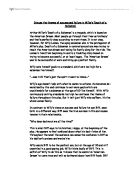The writer of this passage, Arthur Miller, indicates the purpose of characterizing Willy’s development in many different ways. Various tools including literary devices are used along with structure and format to point out the purpose in this case. One of the obvious literary devices used in demonstrating the purpose of characterizing the development of Willy is the use of allusion. Allusion is making a reference to something from literature or a historical event or figure. Willy uses the allusion of Hercules to show his hope in Biff and the ‘American Dream,’ “Hercules—something like that. And the sun all around him.” Willy has always been showing off to everybody that his star, Biff, is going to be something special. Now, he is conversing with his family and telling them that he can visualize his son actually being successful and popular. This is actually a flashback to his past, when he was not having that success. The importance of this allusion to the purpose is that it shows his over-confidence towards life and it foreshadows his downfall as a result of this confidence. It relates in some aspect to the tragedy of Macbeth. Macbeth had a downfall partly due his false sense of security and cockiness also. Secondly, a simile is used that actually goes along with the allusion. Willy says, “Like a young god.” He, here, is making a reference to the god Hercules and comparing Biff and Hercules and the strength portrayed by them along with the power. This is what Willy wants, to somehow have a large control over something and evolve into something unimaginable to the normal mind. Moving on, many times in the play, the stage directions have given examples of diction. For example, the first directions of the play include “tell if grass and trees and the horizon,” “angular shapes,” “solid vault,” “fragile,” and “angry gold of orange.” In this passage at the end of Act I, we are shown an example of diction when the directions say “golden pool of light.” Last but not least, symbolism is used as Willy says, “Gee look at the moon moving between the buildings.” I think that this is a negative symbol for Willy, but he may interpret it another way in his mind. The moon might stand for darkness and the darkness might mean that there is no hope or brightness in the future for Mr. Loman. Willy could interpret the moonlight as beautiful meaning that good things are to come. All of these devices have a strong impact in illustrating the purpose of this passage/piece from the end of Act I in Arthur Miller’s “Death of a Salesman.”
This passage from Act I has great meaning to the main theme of the entire act and play, the “American Dream.” Willy has over-confidence in this dream, which is a major flaw in Willy’s character throughout the play. Willy believes wholeheartedly in what he considers the promise of the American Dream. A "well liked" and "personally attractive" man in business will undoubtedly and deservedly acquire the material comforts offered by modern American life. Willy's interpretation of likeability is superficial. He immaturely dislikes Bernard because he considers Bernard a so-called nerd. This reference was shown earlier in the play when Willy said, “Bernard can get the best marks in school y’understand, but when he gets out in the business world, y’understand, you are going to be five times ahead of him.” His faith in other people, as in this quote, shows/reveals the difference between what he would like in life, and what he has himself right now. The theme also relates to this passage in that it ties together the relationships within the Loman family. His relationship is usually full with tension, but in this passage, a solid family is shown, which is one of the key components of living out the “American dream.” In addition, the rubber tubing is seen again and reminds the audience of Willy’s suicidal attempts. This foreshadows Willy’s character in the second act of the play, where we find that he commits suicide. Mainly, this passage plays an overall key role to the entire context in that it develops Willy’s character and helps to explain what might happen with him in the future.







